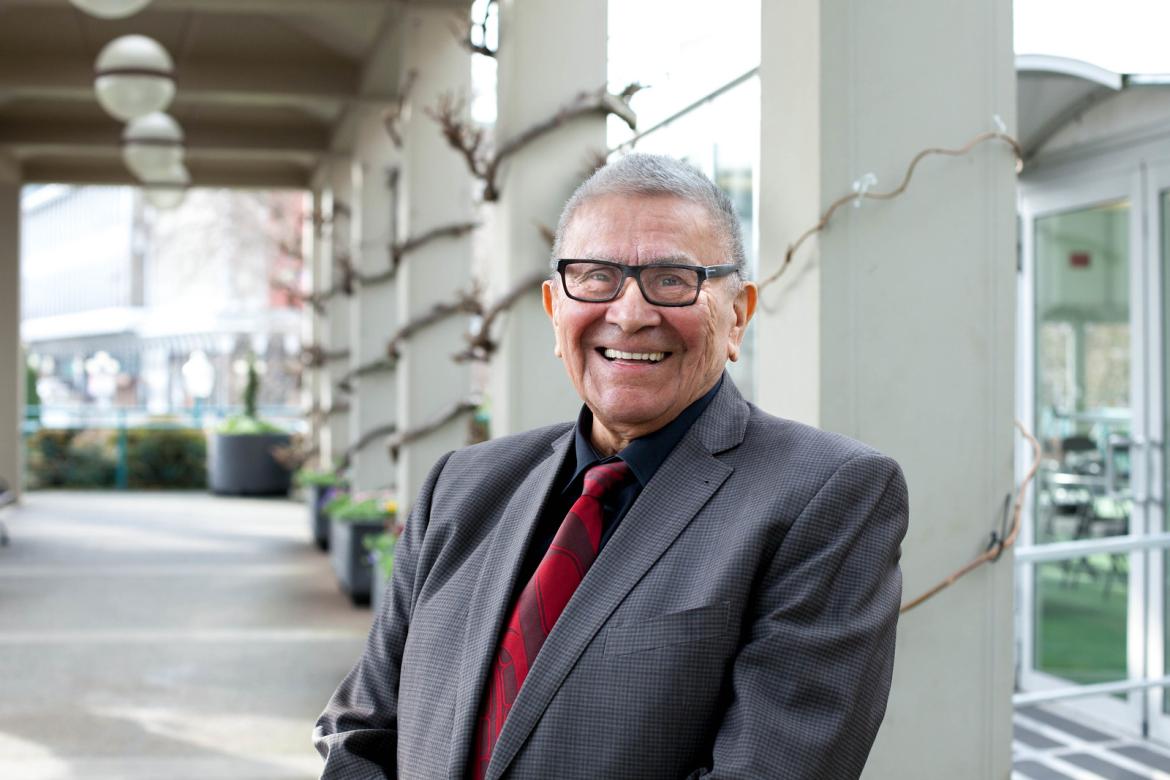
Chief Dr. Robert Joseph, a national leader in reconciliation, is being recognized by VIU with an honorary degree during the June 5 Convocation ceremony.
June 1, 2018 - 1:00pm
Chief Dr. Robert Joseph recognized at the June 4 Convocation ceremony
“Let us find a way to belong to this time and place together. Our future, and the well-being of all our children, rests with the kind of relationships we build today.”
-Chief Dr. Robert Joseph
For world-renowned speaker for peace, forgiveness and reconciliation Chief Dr. Robert Joseph, changing the way people perceive and treat one another all comes down to building better relationships.
“The central goal in my life is to bring people together so they can have dialogue, repair torn relationships and develop a new way forward together,” he says. “I don’t think you can get anywhere without creating an appreciation for each other.”
A Hereditary Chief among the Kwakwaka’wakw peoples, a member of the Assembly of First Nations Elders Council and Ambassador for Reconciliation Canada, Joseph has devoted his life to achieving reconciliation between Canada’s Indigenous and non-Indigenous peoples. His work helped shape the Truth and Reconciliation Commission (TRC) of Canada, which has brought to light the true history of Canada’s dealings with Indigenous peoples.
Joseph was one of four residential school survivors who counselled Prime Minister Stephen Harper on the contents of the landmark apology by the federal government to all survivors. As Ambassador for Peace and Reconciliation with the Interreligious and International Federation for World Peace, he shared a table with leaders from many different countries to share his perspective of faith, hope, healing and reconciliation, and hear the thoughts of others on these important topics.
For his efforts, Joseph has received numerous awards, including the Order of Canada, Order of BC, the Diamond Jubilee Medal, the Jack P. Blaney Award for Dialogue from Simon Fraser University (SFU), the Wallenberg-Sugihara Civil Courage Award and the Indspire Lifetime Achievement Award.
He says receiving these awards, as well as the Honorary Doctor of Laws he receives from Vancouver Island University (VIU) during the afternoon Convocation ceremony on Monday, June 4, all help him further his goal of inspiring others to continue the important work of reconciliation.
“Even though VIU intends to honour me individually, I think they honour the greater idea of diversity and oneness, and that we have to hold each other up and celebrate each other,” says Joseph.
Now an internationally recognized leader, Joseph had a dark past to overcome before he could start down this path. Growing up in Gwawaenuk First Nation territory just north of Knight Inlet, he was taken from his family and community at age six and put in residential school in Alert Bay, a life-changing experience he called “grippingly destructive.”
“The environment was so brutal and dismissive of your individual worth and humanity,” he says. “After 11 years, I had nowhere to go afterwards, and no sense of value or worth.”
As a young adult, Joseph quickly sank into a lifestyle of dysfunction and addiction. He worked many jobs, but couldn’t hold on to them. He got married and had children, but lacked the tools to be a good husband and father.
“It was hard to even try to live a normal life,” says Joseph. “Trauma fuels a rage in you and you act out your hostility. You can’t get over it if you don’t heal in a productive way.”
Joseph’s turning point came about when he was living in Campbell River and drinking so heavily that a concerned friend took him out on his fishing boat in hopes of sobering him up. He promptly passed out and when he woke up early the next morning, everyone else on the boat was sleeping.
“I could smell the booze coming out of my pores and I was so ashamed,” says Joesph. “I got out of the bunk, went to the back of the boat, fell down on my knees and said, ‘God help me.’”
Joseph opened his eyes and began to observe his surroundings through his tears. He began to notice the vibrant colours in the lush, green forests and ocean surrounding him. He elevated his gaze to the heavens, where an image of the entire universe was revealed to him and he heard a voice say, “Look at what you’ve done to yourself. You’re a part of this and I love you.”
“I was connected,” Joseph remembers. “That brought me along the road to the work I’m doing now around reconciliation.”
In 1994, during the First Nations Summit in Vancouver, Joseph shared his story for the first time. He was tasked with working together with residential school survivors, church representatives and politicians to create a process that supports survivors seeking remedies through the courts who were being re-traumatized over and over again.
“In that role, I had to tell my story, but I encouraged others to tell their stories as well so they could feel like they were involved in trying to reach solutions,” he says. “If we don’t tell our stories and invite others to the table, we’ll never be able to mitigate that racism.”
That work led to the expansion of the Indian Residential Schools Survivors Society in 2002, of which Joseph served as executive director for more than a decade. The society helped set the foundation for the Indian Residential Schools Settlement Agreement, a compensation package announced in 2006 that also included funding to establish the Truth and Reconciliation Commission.
2008 was a big year for Joseph, who became a special advisor for the TRC and, as mentioned above, was involved with the Prime Minister’s apology to survivors.
“The fact that he did was so inspiring for me,” Joseph remembers. “It was important for Canadians to accept the truth of what they had been hearing from survivors.”
Omar Karim, Co-ordinator of VIU’s Office of Co-Curricular Engagement & Learning, met Joseph at a Moose Hide Campaign national gathering. The Moose Hide Campaign is working to end violence against Indigenous and non-Indigenous women and children, and Joseph was one of the keynote speakers at the gathering. Since then, Karim has heard him speak several times, including at the 2017 national MBA Games hosted by VIU, which Karim helped organize.
“What I’ve learned from Chief Joseph is a new way of looking at reconciliation,” says Karim. “Rather than being uncertain about how you may address the 94 calls to action laid out by the TRC, he asked us, ‘What can you do on a day-to-day basis to incorporate some of these values into your daily lives?’ Learning about Indigenous culture and sharing my knowledge with others is my way of giving back and taking a step forward.”
Looking ahead, Joseph believes that racism is on a downward trend thanks to rising consciousness of the inequity that still exists in Canadian society. He attributes this rising consciousness to the work that’s been done so far, including the many brave people willing to share their stories to help others gain an understanding of the impacts of what happened.
“There are so many people out there who truly care and want to figure out what they can do to contribute,” he says. “Reconciliation means to me that every child who is born and lives in this country has the opportunity to rise to their fullest potential, to feel free and walk with dignity and hand-in-hand with all other children.”
-30-
MEDIA CONTACT:
Jenn McGarrigle, Communications Officer, Vancouver Island University
P: 250.740.6559 | C: 250.619.6860 | E: Jenn.McGarrigle@viu.ca | T: @VIUNews
Tags: Indigenous | Reconciliation | Announcements



